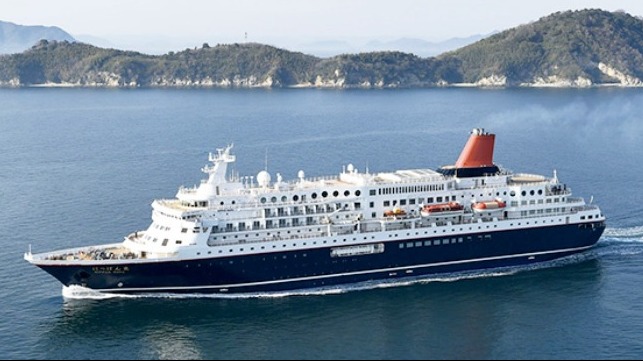Mitsui OSK Plans New Cruise Ships as it Seeks to Diversify Business

Japan’s Mitsui O.S.K. Lines (MOL), while best known for its commercial shipping operations, is looking to new avenues of growth including investments in its cruise ship operations. While not well known for its cruises, the company in addition to its passenger ferries has been operating a single cruise ship for the past 30 years in the domestic market.
MOL confirmed that its board of directors has approved a plan to build two new cruise ships that would continue the company’s long heritage in passenger shipping. The initial plan calls for an investment of approximately $719 million for two 35,000 gross ton cruise ships, the first of which is expected to be delivered around 2027. The cruise ships would be a successor to the company’s popular Nippon Maru, which was built in 1990.
The decision to build the two ocean-going cruise ships, the company said, is part of a portfolio strategy to strengthen its non-shipping business. The new cruise ships would be used to capture domestic and international cruise demand, which MOL noted has less linkage to shipping market fluctuations and is expected to expand in the future.
Discussing the decision, MOL’s President and CEO Takeshi Hashimoto told Nikkei that they view the cruise industry in Japan as a rare growth opportunity. Nikkei reports that if the first two ships are successful, MOL is considering building two additional cruise ships.
The board’s approval of the plan to expand the cruise operations followed Japan's recent announcement that it was reopening for international tourism and would permit international cruises again after a two-and-a-half-year pause due to COVID-19. MOL’s Nippon Maru had suspended operations in February 2020, but starting in October 2020 was permitted to resume sailing on short, domestic cruises.
MOL is set to become the first to operate an international cruise with the Nippon Maru scheduled to sail a special 48-day cruise on December 15. As part of the company’s efforts to help Mauritius rebound from the disastrous grounding and oil spill in July 2020 from the Wakashio, which was owned by MOL, the company promised to operate a cruise to the island. The Nippon Maru is scheduled to sail with stops in Singapore, Male in the Maldives, Port Louis in Mauritius, and Toamasina, Madagascar.
The cruise business, which has only been marketed in Japan, continues the company’s passenger operations which trace back to the 1880s and the founding of the predecessor companies Osaka Shosen and Mitsui Sensen, which operated trans-Pacific passenger services into the 1960s. MOL converted to cruising in 1972 and in response to the rising demand in Japan for leisure cruises decided to buy and then build modern cruise ships.
The Nippon Maru, which is 547 feet long and 22,472 gross tons, remains very popular as one of only three dedicated cruise ships operating in Japan. Built by Mitsubishi, she carries just 524 passengers. She has been modernized, including a refit before resuming service in 2020, but is considered dated by modern cruise industry standards.
NYK also maintains a domestic cruise operation with its single ship being the Asuka II, which was also built by Mitsubishi in 1990. However, NYK has ordered a new cruise ship being built by Meyer Weft which is due for delivery in 2025. Japan’s third cruise company, Venus, recently announced that it will end operations as of the start of 2023.

that matters most
Get the latest maritime news delivered to your inbox daily.
MOL’s decision to expand its cruise operations is part of a diversification effort. Currently, 80 percent of its revenues are coming from the containerships operated as part of One Network Express (ONE). The company recently has expanded its real estate investments, including into Southeast Asia. Like many Japanese companies, they are also looking to the opportunities in the emerging offshore wind industry. MOL launched its Wind Power Energy Business Division in 2021 and has made investments including operating Taiwan’s first custom-built SOV and in a Dutch startup that is developing floating wind turbines.
Hashimoto told Nikkei that he believes the company’s core shipping business will see slow growth. He expects, while they will work to replace ships with new green technologies, that the fleet will remain similar in size.
